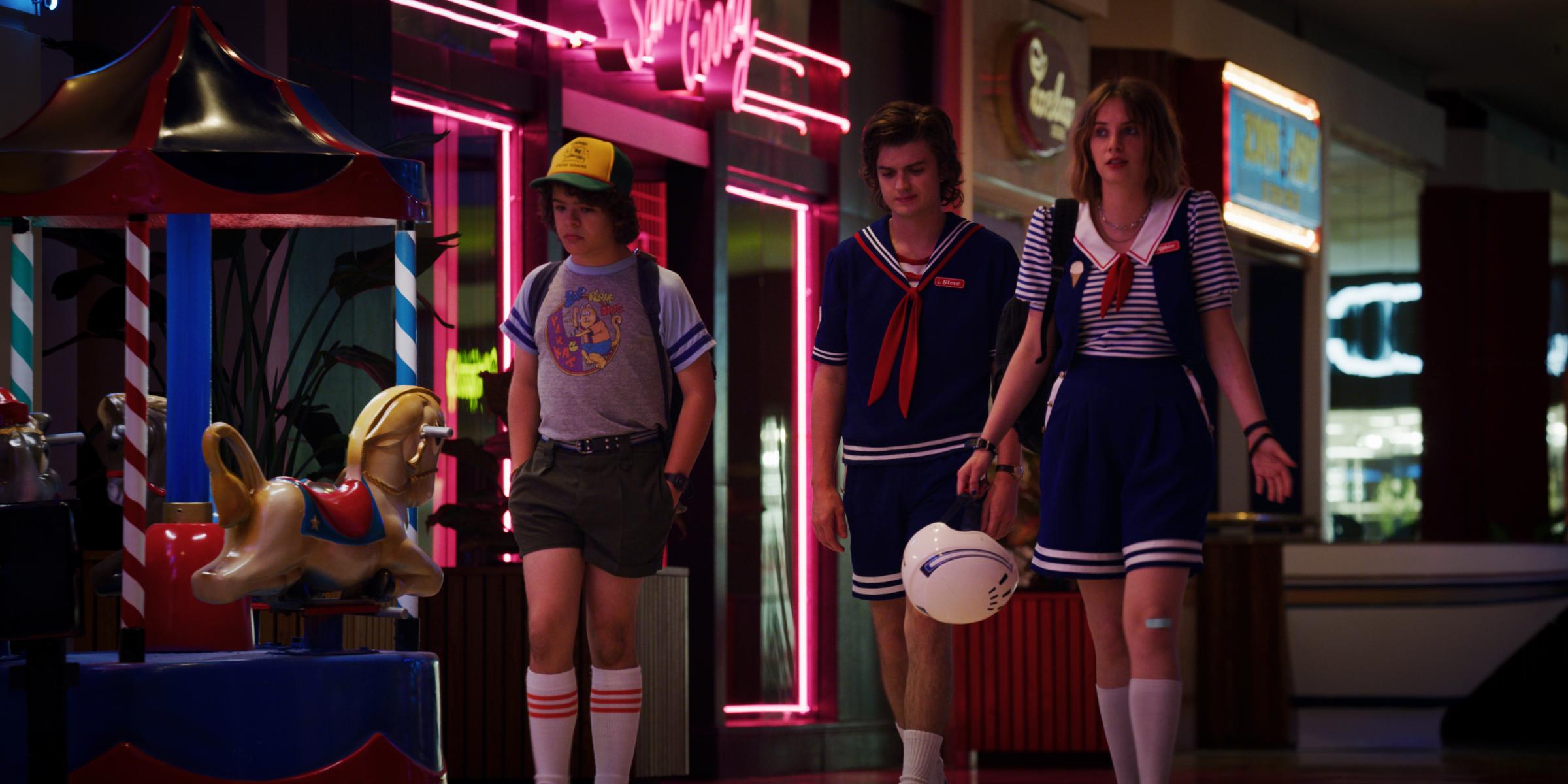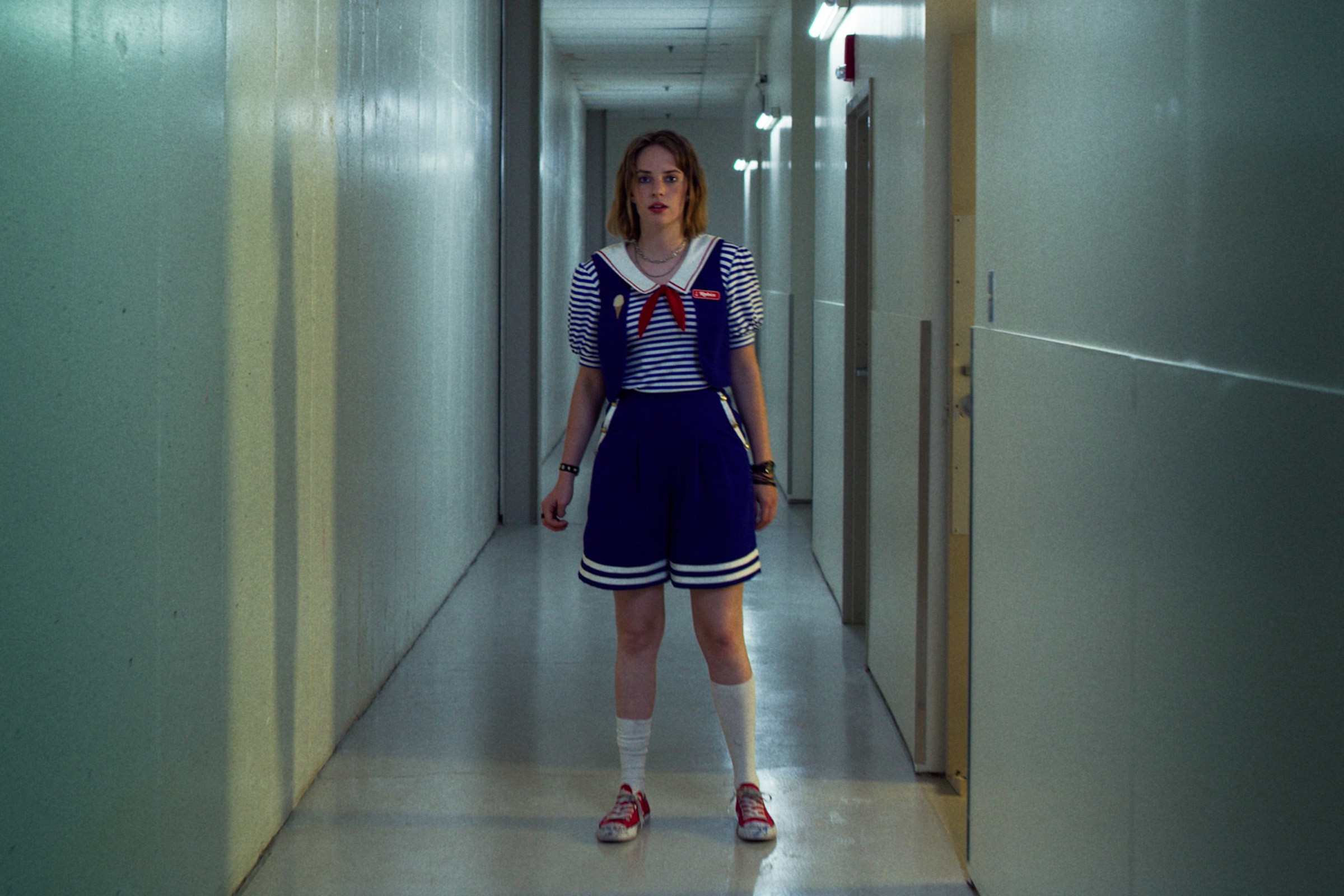Warning: This post contains spoilers for Stranger Things season 3.
As Robin on Netflix’s Stranger Things, 20-year-old actor Maya Hawke got her breakout role.
A few essential facts to get out of the way: Hawke’s parents are Hollywood veterans Uma Thurman and Ethan Hawke. She’s played the beloved Louisa May Alcott character Jo March in PBS’ 2017 Little Women miniseries, and she’ll appear as Flower Child in Quentin Tarantino’s Once Upon a Time In Hollywood, out July 26. But the cultural behemoth that is Stranger Things didn’t only show off her acting talents. It also made her a meme hero.
For a newcomer to the series, Hawke’s off to a promising start. On the show, she nails the razor-sharp wit of Robin, a co-worker of Steve’s (Joe Keery) at the nautical-themed ice cream parlor Scoops Ahoy.
The character immediately resonated with fans. In fact, Robin emerges as one of the story’s most skilled investigators as the mysteries of Hawkins deepen in their complexity. Her natural friendship with her fellow ice cream slinger in the trenches was just another addictive highlight for fans. And satisfyingly, the show leaves the nerdy-girl-pines-for-the-popular-guy-trope in the dust and develops the duo’s relationship in more nuanced and unexpected ways.
Hawke says the reception took her by surprise. “There’s such a risk in joining a show that already has so many beloved characters,” she tells TIME. “I didn’t know people were going to embrace Robin.”
In conversation with TIME, Hawke discussed her character’s unexpected fate, getting tied up with Joe Keery and potential Stranger Things season 4 shenanigans.
TIME: How much of Robin’s personality is scripted and how much did you contribute?
Hawke: The Duffer brothers [the series’ creators] write the series as we’re filming it, and the character they had in mind evolved and changed as they got to know me better. Robin has a lot of walls with her dark sarcasm and her attitude, but as she gets more involved with Steve and Dustin, she can be herself more. That mirrors the process of the Duffers; taking the initial sketch of a bored teenager and fusing her with my energy as a hyper, warm, excitable person. It was all shepherded by the Duffer brothers with me as a vessel more than anything else.
There’s certainly a warmth to her. What kind of notes did the Duffers give you and other Scoops Troop members?
We’d laugh at how they’d say thinks like, “Go faster! More terror! More excited!” The Duffers encourage all the people in the cast to be as much of themselves as possible, and they sort it all out in the editing room. They really encouraged us to play. In finding this new character, I had to put a lot on the canvas to make an image emerge and I think next year, Robin will be more honed in. I’ll know right away what direction to take her in.

She’s a miraculously quick study. How do you explain her language abilities as an actor?
I have a backstory for her, but the Duffers might want to reveal something different in future seasons. I think Robin has never felt at home in Hawkins, and if you don’t feel like you fit in, you work extra hard to get out. That’s where her knack for Russian and speaking four languages and being in band come from. I think it’s about her desire to make herself big enough to get free.
Robin’s an agent of action. And like Joyce, Erica, and Nancy, she really moves the mission forward. Is the show telling us anything with these women’s storylines?
Women are just as capable of action-packed adventures as men. The Duffers just want to spread the love, and it makes the show more diverse.
People felt you and Joe Keery were so dynamic together. How’d you cultivate that chemistry?
It was really natural from the first screen test. He’s such a playful and collaborative scene partner. He can walk into a room and tell you five things that would be funny to play with or act with. If you go through Joe Keery’s career, there isn’t a scene partner that he didn’t have chemistry with. He’s really generous.
What were those giggly truth serum scenes like to film?
I think we were laughing about the circumstance of being tied to two chairs with your fellow actor for six hours or ten hours for two days in a row. We had to have a fleet of five people to unwrap us if we needed pee or get a drink of water. People were pouring water into our mouths between takes.

Sounds like a marathon. And you wear the Scoops uniform the whole season. How’d you pull that off?
We had three or four. One would get really damaged and then we’d go back in time and shoot an early scene with a new one. I love the way the costume fit. It’s a small modification of my normal uniform; my own personal blue jeans and a stripe-y shirt. I love a pair of high-waisted shorts.
Robin gets a monumental moment. How did you try to approach her coming out scene as truthfully as possible?
By then, the truth serum is faded or almost gone, but the placebo loosens Robin up enough to let her have that confession as her full self. It felt unique because it’s coming out from a place of need. People weren’t coming out left and right, especially girls in Indiana then. So there had to be a need. She needed to take care of Steve, who just made himself vulnerable. What can she do to tell him the truth? How can she preserve their relationship to say she doesn’t have the exact same feelings for him but she loves him and their new friendship but can’t meet him in the same place? I was nervous because of course that moment is really important for kids and adults across the world. I wanted it to feel truthful, and I wanted people to feel seen in that moment.
How do you hope it might reach people at a time like this?
It’s really important to see diversity, not just in niche shows built for that, but in shows projected into homes across America for people who aren’t necessarily looking for that. Sometimes we have more empathy for characters than people we see on the streets. If playing a character can open someone’s heart even a fraction of an inch so that people can fall in love with Robin and then fall in love with her truth, that would be hugely meaningful.
There are a lot of shows that would tell us Robin and Steve end up together. Why show this platonic friendship?
Yes, I think that coupling up left and right isn’t particularly true to life. It also makes for pretty one-dimensional television. The most important relationships in my life are my platonic friendships. The fact that people are seeing this friendship between a man and woman represented onscreen is really important. It’s a huge part of all of our lives, but you don’t see it a lot.
Do you have any big dreams for Robin for Season 4?
I don’t think that I’ve been confirmed or denied next year. I had such a good time doing the show. I hope to get to be in season 4 and that Robin gets to continue to grow and develop to use her brains to unravel and unveil the mysteries of the Upside Down because I think she’s really smart.
Do you think Robin and Steve would ever fight over a girl?
I think that would be a great premise. I also think Steve as a wingman could work. I think there are all kinds of opportunities for hijinks.
Steve cares very much about his hair in the show. What’s it like in real life?
It’s flawless!
More Must-Reads From TIME
- The 100 Most Influential People of 2024
- Coco Gauff Is Playing for Herself Now
- Scenes From Pro-Palestinian Encampments Across U.S. Universities
- 6 Compliments That Land Every Time
- If You're Dating Right Now , You're Brave: Column
- The AI That Could Heal a Divided Internet
- Fallout Is a Brilliant Model for the Future of Video Game Adaptations
- Want Weekly Recs on What to Watch, Read, and More? Sign Up for Worth Your Time
Contact us at letters@time.com